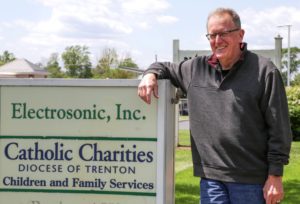“Repairing the hurts” after domestic violence
A few years into John’s marriage, things soured. His wife shunned intimacy, and John had an affair. The couple argued all the time. Still, John hoped to work things out.
But in 2010, John ended an especially volatile argument with his fists, a fit of violence that landed him in jail on domestic violence charges and later, in court, where a judge ordered him into anger-management counseling. (John is a pseudonym to protect his identity.)
John tried three other programs before reaching out to Catholic Charities, Diocese of Trenton’s Family Growth Program in Mercer County. There, he joined the Domestic Violence Treatment Group, a six-month therapeutic program where members meet weekly to learn how to transform their anger, violence, and controlling behaviors into compassion for themselves and others.
“Of all the programs I went to, Catholic Charities’ program was the most transformative, empowering, and life-equipping,” said John, now divorced. “It gave me a skill set and tool chest that I am able to use to this day. This program told me to love myself – and how to love myself. It’s one thing to know the language of anger. But it’s another, powerful thing to learn how to speak back to yourself through those moments and to not operate out of anger in an unhealthy way.”
Uncovering “core hurts”
 Program Supervisor David J. Thomas (pictured right) said men who assault women often are condemned as unfeeling monsters unwilling to take responsibility for their actions. But the violence, dominating personality, and exaggerated manhood an abuser may exhibit typically mask “core hurts” – hidden shame and pain that often are rooted in childhood trauma, Thomas said.
Program Supervisor David J. Thomas (pictured right) said men who assault women often are condemned as unfeeling monsters unwilling to take responsibility for their actions. But the violence, dominating personality, and exaggerated manhood an abuser may exhibit typically mask “core hurts” – hidden shame and pain that often are rooted in childhood trauma, Thomas said.
“The men need to learn how to heal these core hurts,” Thomas explained. “No one is responsible for the hurts they suffered as a child, but each person is responsible for repairing the hurts and healing the damage before it drives him to hurt others.”
Thomas has worked for Catholic Charities, specializing in family violence, since 1977. He teaches the men “the four Rs” – recognition, responsibility, regulation, and reparation – to help them identify triggers and change their behavior and outlook.
One goal of therapy is to stop the intergenerational cycle of abuse. Another is to stop emotional and verbal abuse, which can be just as damaging as physical violence, and replace it with compassionate, responsible behavior, no matter what the other person does, Thomas said.
Check your engine
So many men who complete the program want to share what they learned that about half return for “Passing It On” night, where they support new group members.
That includes John, who has not only returned to mentor men in Thomas’ program, but also teaches the strategies he learned at Catholic Charities to other men he counsels as a church pastor.
“Anger is nothing but a check-engine light. Anger is telling you that something else is going on, and you need to check under the hood to figure things out,” John said. “David creates a climate of learning, vulnerability, growth, reflection, and self-responsibility, a climate where you can check your engine and fix it.”
For more information: David Thomas, program supervisor of the Domestic Violence Treatment Group, at (609) 394-5157.
Subscribe for more news
To subscribe to our blog posts and news releases, fill out the fields below.
